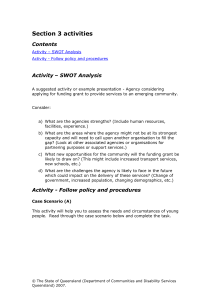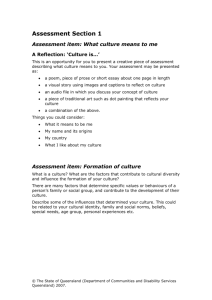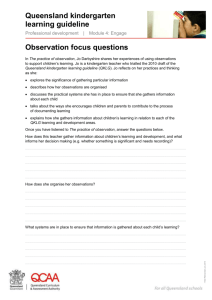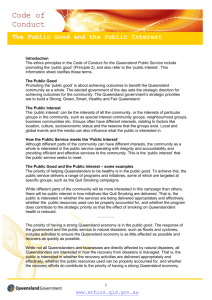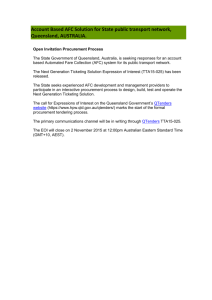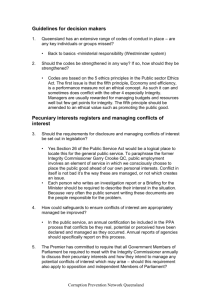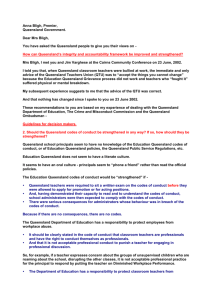Integrity and Accountability Forum - Department of the Premier and
advertisement
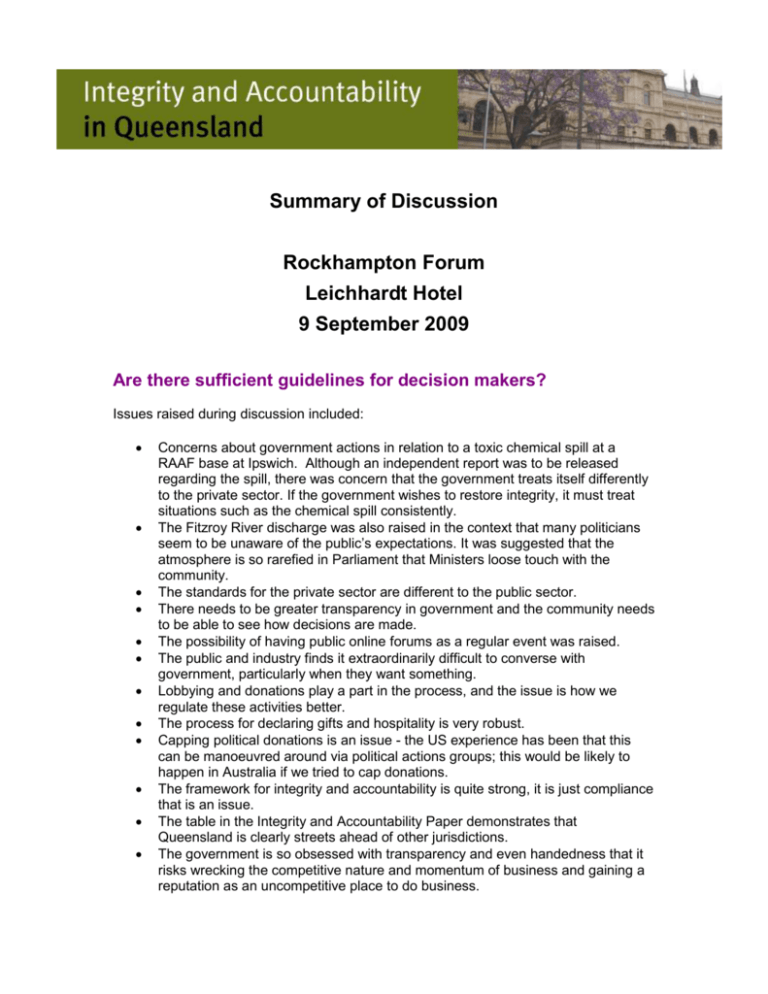
Summary of Discussion Rockhampton Forum Leichhardt Hotel 9 September 2009 Are there sufficient guidelines for decision makers? Issues raised during discussion included: Concerns about government actions in relation to a toxic chemical spill at a RAAF base at Ipswich. Although an independent report was to be released regarding the spill, there was concern that the government treats itself differently to the private sector. If the government wishes to restore integrity, it must treat situations such as the chemical spill consistently. The Fitzroy River discharge was also raised in the context that many politicians seem to be unaware of the public’s expectations. It was suggested that the atmosphere is so rarefied in Parliament that Ministers loose touch with the community. The standards for the private sector are different to the public sector. There needs to be greater transparency in government and the community needs to be able to see how decisions are made. The possibility of having public online forums as a regular event was raised. The public and industry finds it extraordinarily difficult to converse with government, particularly when they want something. Lobbying and donations play a part in the process, and the issue is how we regulate these activities better. The process for declaring gifts and hospitality is very robust. Capping political donations is an issue - the US experience has been that this can be manoeuvred around via political actions groups; this would be likely to happen in Australia if we tried to cap donations. The framework for integrity and accountability is quite strong, it is just compliance that is an issue. The table in the Integrity and Accountability Paper demonstrates that Queensland is clearly streets ahead of other jurisdictions. The government is so obsessed with transparency and even handedness that it risks wrecking the competitive nature and momentum of business and gaining a reputation as an uncompetitive place to do business. Whatever the outcome of this process, we have to ensure that Queensland’s competitive advantage is not destroyed. What we do need is a constant reminder of what is ethical; the problem is keeping that at the forefront of people’s minds. Research shows that an ethical organisation can make otherwise unethical people act ethically. It was suggested that the codes of conduct are not tight enough given the experience of the Nuttall case. However, you will always get people doing the wrong thing and the fact that Nuttall was caught means that the system works to catch those people who display an appalling lack of integrity, if not criminality. The public sector should not be competing with the private sector where public servants are using their position in government to gain an advantage. However, the usual practice in the public sector is that where a person is employed full-time, in order to gain employment outside, that person must obtain approval from their department to undertake secondary employment. The factors that are usually looked at is whether it is a conflict of interest, the amount of hours and physicality of the work being performed. If people see situations which you think are unfair or where a public servant is misusing their position, you should get in touch with the relevant department. The private sector looks to the government for guidance and as the benchmark for exemplary behaviour. It is concerning when the regulators start regulating themselves (e.g. in the United Kingdom). Any time this happens, the credibility of the government is brought into question. Complaining to the department regarding one of their own public servants is also a concern as it lacks transparency; there is a need for an independent forum or someone you can go to with your complaint. The guidelines governing the public sector are becoming too complex and there is a need for simplification. Concerns were raised that there is a trend towards sloppiness and a continuum of incorrect behaviour in the public sector. Queensland is the only State in Australia that does not have an upper house, so from the top down, there is a lack of accountability; the question was raised as to whether we are trying to patch a system up that is inherently flawed. The lack of an upper house over the last 70 years has caused a cultural problem in Queensland and reinstating an upper house would gain respect from the community. However, a lot of upper houses do not work properly (with some parts of the Senate being exceptional). The main value of the Senate is the strong committee system. In Queensland, we have the embryo of a strong committee system and introducing more politicians in Queensland is unlikely to resonate with the public. The problem is getting the message to the public that a committee can do a similar job to an upper house. Are the mechanisms to find unacceptable behaviour sufficient? Issues raised during discussion included: The perception from a lot of other jurisdictions is that the Queensland System (i.e. the overarching integrity system) works, and it has, in fact, been copied by other jurisdictions. There was discussion about who the CMC and Integrity Commissioner report to, as well as the independent role of the Electoral Commission. Concerns were raised regarding the referral of complaints regarding local government to the CMC for investigation, only to have the complaint referred back to the local government for investigation. The referral of such complaints back to local government or the relevant department is not only a resource issue, but also due to the principle of devolution. Most matters investigated by the departments are small matters and come back to the issue of embedding a culture of ethics into the organisation. The best way to do this is to have the organisation take responsibility for its own internal ethics. Supervision by the CMC of investigations undertaken by departments is also an important role. The issue of reprisals taken against people who make a complaint was also raised. However, the whistleblowing legislation allows disclosure of confidential information when made properly, and reprisals can be investigated by the CMC. There is concern about reprisals that result from a complaint made by a private sector organisation against a public sector department; in such cases, the legislation does not cover reprisals against a private sector organisation. The whisteblowing legislation could be amended to protect against further reprisals and in NSW, the onus of proving that something was a reprisal is not on the person who complained. There is a general lack of trust in politicians and a perception that they are in government for the wrong reasons. The lack of transparency is a lack of understanding about what happens in government. The media does not cover government activity enough. Perhaps government could take it upon themselves to get that sort of information to the community. Government websites are difficult to navigate and there is a need for further information in the community about what the government is doing. The NSW Government website works much better than the Queensland Government website. However, one of the effects of the new Right to Information regime is that agencies are now required to place a lot more information on their websites in order that people do not have to submit a Right to Information request. The provision of further information about the government to the community would need to be balanced though as in the lead up to elections, there is often the perception that advertising is in fact government “spin”. Any information provided would need to come from the opposition as well. It is not information about what the government is doing that is required, but how government works; this could be supported by all political parties.


